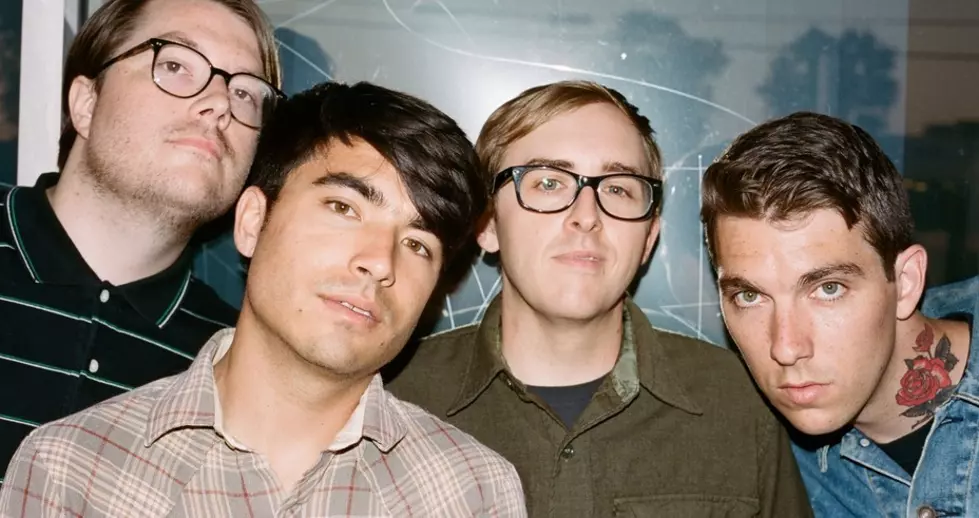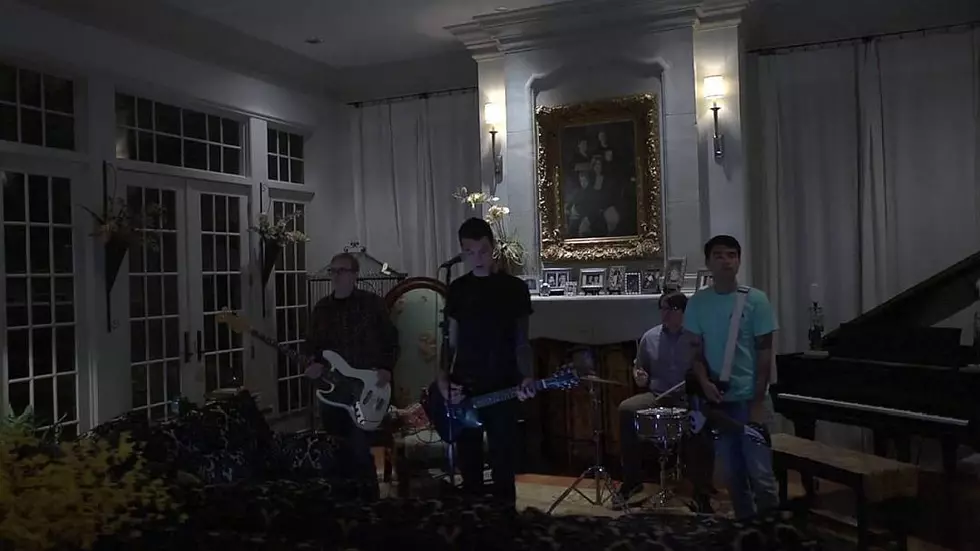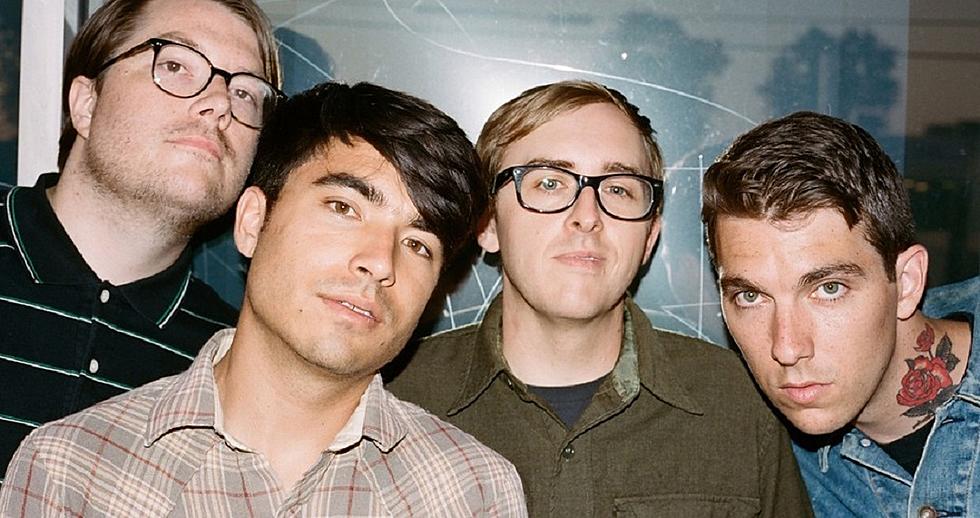
Joyce Manor Evolve Beyond Pop-Punk Hangovers on ‘Cody’
There comes a time in a band’s life when they need to make a decision: Keep making no-budget recordings to retain a moderate fan base and punk cred, or fucking go for it. Torrance, Calif., group Joyce Manor chose the latter, and guess what? It worked. In 2014, they signed to Epitaph to release their third album, Never Hungover Again, and immediately they attracted the attention of new fans and the music press, which had been nonexistent for their first two albums. Over the past two years, they’ve toured almost non-stop, performing in every city they could. And then it came time to write their fourth album, along with the decision to do it in a proper studio with an experienced producer. Not only did they survive with all of their fans intact, but they made their best album yet.
Even more than its predecessor, Joyce Manor’s new album, Cody, progresses from the spirited pop-punk of their earlier days to find a (gulp) mature sound to complement the age of the band’s members. With three of the four approaching 30, they felt it was time to write songs that spoke to this phase in their life. One way to accomplish this was to bring in a pro like Rob Schnapf (Saves the Day, Elliott Smith, Guided by Voices) to not only make the album sound better, but also make the songs better. His role quickly evolved from producer to “fifth member,” assisting frontman Barry Johnson whenever he hit a songwriting snag.
The big concern that always comes with these kinds of changes is that the music will suffer in some way, but that isn’t the case with Cody. These songs are still rooted in pop-punk and teeming with impassioned, relatable lyrics and juicy melodies. The biggest difference is that the band is aging just like the rest of us, and, well, it sounds like a million bucks compared to 2012's Of All Things I Will Soon Grow Tired.
We talked to Johnson on the phone while he grabbed a coffee at his local beanery and discussed the benefits of going hi-fi, why writing an acoustic song makes sense, and why Punk-O-Rama still matters to him.
One thing I love about a Joyce Manor album is that it I know I won’t get bored listening, because it’s over so quickly. That said, at 25 minutes, Cody is almost a double album for your standards.
It’s never a conscious thing. We don’t have 40 minutes of music sitting around and then get rid of half of it. I write a lot of songs, but I’m not excited by everything I write. When it comes down to making an album, I just want it to be exciting for me the whole way through — stuff that I am especially proud of. When I put that together, there ends up being not a ton of material per album cycle. I would say every eight or nine songs I write, only one of them is any good. If we had 40 minutes worth of music that we really wanted to put out into the world, then I wouldn’t hesitate. But I would really have to feel that way, and it hasn’t been the case up until now.
You previously said that you were anticipating some kind of fan backlash with Never Hungover Again, but it didn’t come. Are those feelings gone or do you still feel like it could happen with Cody?
I thought with this one it’d be way more so. I don’t know why! I thought with Never Hungover Again, it would be too poppy for fans. But that was just the kind of stuff I was writing, and as I continued to write songs, they just kept getting poppier and poppier. I thought that might turn the people off who wanted something angrier, harsher or [more] dissonant. As we do less of that, I always wonder about that. So, yeah, I thought Cody might be too mid-tempo or grown-up-sounding, but it hasn’t. I’m thankful people aren’t turned off by it, but I was definitely prepared for that. I totally get that we’re not a low-key indie rock affair, but I feel like it’s definitely more indie rock and less pure, unadulterated pop-punk than some of our past records.
It was a gigantic difference. The main thing was [Schnapf] had ideas that were very, very good, but they kind of went against my gut. Because that’s always what I’ve trusted until now. It’s how I know when a song is right. If something clicks, I can relax. But until that happens, I’m gonna stress out. So, we were doing certain things with Rob where he’s like, “I’m not so sure about this.” And I was already sure by trusting my gut that it was right, so I would have to try his idea, and not be so sure about it at first, and then come around to his idea, which was totally new and super, super valuable. In every instance, it was right. There was also a lot of technical guitar stuff that he tweaked. Like, “It’ll sound better if you play this seventh chord here,” and adding harmonies. And then sonically, what he contributed made a huge difference.
So, you guys are converts?
To working with a producer? Oh, absolutely. All I can think about now is how all of the other records could’ve benefited from a producer. All the time I struggled with this or that, or didn’t know what to do here, I could have gone to that person and they’d say, “Easy dude, just do this!” That’s another reason why our records are short. We don’t know the tricks to take a song and stretch it out to maximum capacity. We would keep them short so they wouldn’t become boring.
“Stairs” is four minutes long, which is a good minute longer than any other Joyce Manor song. Was that because of Rob?
It didn’t used to have a part that repeats, and he really pushed for that. He said, “It’s a really good song, but it should have a chorus. Go back and do this part again.” Together, we figured out how to accomplish that. And then in the studio, we were messing around and ended up making the end section longer. There were these shoegaze-y parts, these guitar swells. We took it from a song that was two minutes and 40 seconds to a four-minute song.
There’s a line in “Stairs” where you sing, “Oh, I can’t do laundry.” Is that true?
No, I absolutely do know. I was 19 when I wrote that. I’m 29 now, and I’ve been doing my own laundry for years and years. Even at 19, I could do my own laundry.
All of your previous records were made really quickly. What was it like having two months to make this record?
It helped so much. If you really want to make something like that, you need that kind of time. When you listen to our first album or even Never Hungover Again, they’re really budget albums. Well, Never Hungover Again was mixed professionally, but it still has a scrappiness to it. If you have two hours in-house, that won’t turn out as well as if you have all of the time you need. Some things need time, and now that I’ve seen what can go into making an album … Before, I really didn’t know what you could do in a studio. Like, what do you do for two months? Honestly. You record the drums and guitars and put vocals down, but how do you stretch that over two months? And I learned [how] you do that. Now, that I know. I don’t see myself ever saying, “Let’s make a punk record and do it in five days.” What’s the point? We did that. We did it our of necessity. It’s definitely crucial.
You surprised me there by slipping “Do You Really Want to Get Better” onto the album. What made you want to add an acoustic song?
I always like when bands do that. It breaks up the album in a cool way. It was a song Chase [Knobbe, guitarist] and I had written, and planned to make electric, and then slowly lost interest in that idea. When we tried to make it electric, it didn’t really work. And then we had 10 songs for the album, including one fast pop-punk [song], which, after we recorded it, didn’t really feel like it fit on the album. It was easily the weakest track. And this was when we were mixing. We were done recording. Meanwhile, the record was going to be nine songs that we were really, really proud of and worked well together. And Chase said, “How about that acoustic song? Do you want to record it really quick?” So, Rob set up some mics, we recorded it and it came out really, really good. Having done a lot of that stuff, Rob is really good at recording that kind of stuff. There is a great vibe to that song. I think it’s really pretty. It pretty much came together at the last minute.
What is the story behind the album cover — that dog chewing on the mannequin head?
We actually had another album cover ready to go, and then my friend Adam sent me that photo, saying, “I took this photo and I think it has a real Joyce Manor vibe. If you ever want to use it for anything, let me know, because I’d be honored.” And I thought to myself, “Fuck! It does have a Joyce Manor vibe!” So, we had to stop the presses on our record. All of the artwork had been submitted and we had to say, “Um, we have a new cover.”
Will we ever see the original?
Yeah! It’s a drawing of some potted plants that my friend Alex did. And it was heartbreaking having to tell him that we weren’t gonna use it. We still paid him for it. But it felt bad that we weren’t ending up using it. Maybe for the 10-year anniversary reissue we’ll use it as an alternate cover.
Is it true that there is a song written about a dog on the record?
No. A lot of kids have asked me if “Constant Headache” was written from a dog’s perspective, for some reason. I’ve been asked that on different occasions by multiple people who don’t know each other. And I read something on the internet, and people kept giving me theories about it. I forget what made sense about it, but nothing really. I don’t get why people think it’s about a dog. It’s about a person. Like most songs.
Brett Gurewitz recently told Pitchfork about how signing Joyce Manor was a long courtship, but that you grew up mail-ordering volumes of Punk-O-Rama from Epitaph. I take it signing to the label was a big deal for you?
It was and it wasn’t. I don’t really think I’m that sappy of a person. I grew up on Epitaph big-time, and they had a lot of bands, even currently, that I really like. But I wasn’t living out this childhood fantasy of being on my dream record label. I am still doing what makes sense for me in this part of my life, and it was mostly because I really liked Brett and everyone at Epitaph. They were all very cool, genuine music fans who are fun to talk to about music. It just made sense for that reason. And then the bonus was I grew up with this music, which is a huge part of my personality.
Okay, so what's the best volume of Punk-O-Rama?
I like Punk-O-Rama 2 the best. That was the first one I bought, so maybe that’s why. Three’s a lot of good stuff on it, and a lot more stuff on it. I think 2 was a little shorter and a little more curated; it’s got Poison Idea, Descendents, Millencolin, Rancid, and really good tracks and sequencing. As an album, it works really well. At that time, Brett had some garage-y sounding bands like the New Bomb Turks and the Joykiller, more rock 'n’ roll punk stuff. Yeah, that’s a great album.
That album cover is a classic.
Yeah, the logo pissing on the wall. Classic.
So, when you signed, did you raid the warehouse and take whatever records you wanted?
[Laughs] No, and I didn’t really want to. That’s just not where I am in my life, trying to hoard Punk-O-Rama CDs. I throw on 2 now and again because it’s still really good to me. I’m not one for a nostalgia trip. There is some great shit on there. It’s stood the test of time. Actually, I say that, and then on both records of ours, I insisted on using the old ’90s Epitaph logo instead of the new one. I just wanted to see the old one when I looked on the back of our record. And they were totally into it, like, “Hey, that’s cool.”
More From CLRVYNT









